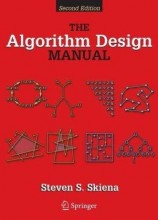
|
FreeComputerBooks.com
Links to Free Computer, Mathematics, Technical Books all over the World
|
|
- Title: The Algorithm Design Manual
- Author(s) Steven S. Skiena
- Publisher: Springer; Corrected edition (1997); Springer; 2nd edition (2010)
- Paperback: 752 pages
- eBook: PDF (739 pages, 3.89 MB)
- Language: English
- ISBN-10/ASIN: 1849967202
- ISBN-13: 978-1849967204
- Share This:

|
This book is intended as a manual on algorithm design, providing access to combinatorial algorithm technology for both students and computer professionals. It explains the fundamentals of algorithms in a story line that makes the material enjoyable and easy to digest.
Most professional programmers that I've encountered are not well prepared to tackle algorithm design problems. This is a pity, because the techniques of algorithm design form one of the core practical technologies of computer science.
Designing correct, efficient, and implementable algorithms for real-world problems requires access to two distinct bodies of knowledge:
- Techniques - Good algorithm designers understand several fundamental algorithm design techniques, including data structures, dynamic programming, depth first search, backtracking, and heuristics. Perhaps the single most important design technique is modeling, the art of abstracting a messy real-world application into a clean problem suitable for algorithmic attack.
- Resources - Good algorithm designers stand on the shoulders of giants. Rather than laboring from scratch to produce a new algorithm for every task, they can figure out what is known about a particular problem. Rather than re-implementing popular algorithms from scratch, they seek existing implementations to serve as a starting point. They are familiar with many classic algorithmic problems, which provide sufficient source material to model most any application.
- Steven Skiena is Professor of Computer Science at Stony Brook University. His research interests include the design of graph, string, and geometric algorithms, and their applications (particularly to biology).
- Data Structures and Algorithms
- Computational Complexity
- Operations Research (OR), Linear Programming, Optimization, and Approximation

- The Algorithm Design Manual, 2nd Edition (Steven S. Skiena)
- The Mirror Site (1) - PDF
- The Mirror Site (2) - PDF
- 1997 Edition (HTML)
- Book Homepage (Errata, Lecture Notes, Videos, etc.)
-
 Algorithm Design (Jon Kleinberg, et al)
Algorithm Design (Jon Kleinberg, et al)
This book introduces algorithms by looking at the real-world problems that motivate them. The book teaches a range of design and analysis techniques for problems that arise in computing applications.
-
 Lecture Notes for the Algorithms (Jeff Erickson)
Lecture Notes for the Algorithms (Jeff Erickson)
This lecture notes uniquely combines rigor and comprehensiveness. It covers a broad range of algorithms in depth, yet makes their design and analysis accessible to all levels of readers. Each chapter is relatively self-contained and can be used as a unit of study.
-
 Algorithms: Fundamental Techniques (Macneil Shonle, et al)
Algorithms: Fundamental Techniques (Macneil Shonle, et al)
The goal of the book is to show you how you can methodically apply different techniques to your own algorithms to make them more efficient. While this book mostly highlights general techniques, some well-known algorithms are also looked at in depth.
-
 Elementary Algorithms (Xinyu Liu)
Elementary Algorithms (Xinyu Liu)
This book doesn't only focus on an imperative (or procedural) approach, but also includes purely functional algorithms and data structures. It teaches you how to think like a programmer - find the practical efficiency algorithms to solve your problems.
-
 Algorithms, 4th Edition, by Robert Sedgewick and Kevin Wayne
Algorithms, 4th Edition, by Robert Sedgewick and Kevin Wayne
It surveys the most important algorithms and data structures in use today. Applications to science, engineering, and industry are a key feature of the book. We motivate each algorithm that we address by examining its impact on specific applications.
-
 Algorithms and Data Structures (Niklaus Wirth)
Algorithms and Data Structures (Niklaus Wirth)
From the inventor of Pascal and Modula-2 comes a new version of Niklaus Wirth's classic work, Algorithms + Data Structure = Programs (PH, l975). It includes new material on sequential structure, searching and priority search trees.
-
 Introduction to Design Analysis of Algorithms (K. Raghava Rao)
Introduction to Design Analysis of Algorithms (K. Raghava Rao)
This book was very useful to easily understand the algorithms. This book is having enough examples on every algorithm. It has written for the sake of students to provide complete knowledge on Algorithms.
-
 Problem Solving with Algorithms/Data Structures using Python
Problem Solving with Algorithms/Data Structures using Python
This is a textbook about computer science. It is also about Python. However, there is much more. The tools and techniques that you learn here will be applied over and over as you continue your study of computer science.
-
 The Design of Approximation Algorithms (D. P. Williamson)
The Design of Approximation Algorithms (D. P. Williamson)
This book shows how to design approximation algorithms: efficient algorithms that find provably near-optimal solutions, including greedy and local search algorithms, dynamic programming, linear and semidefinite programming, and randomization, etc.





